by Jenny Rose | Dec 28, 2017 | Connection & Community, Emotional Intelligence
Character: The mental and moral qualities distinctive to an individual; a person in a novel, play or movie.
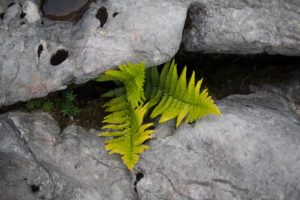
Photo by Nick Grappone on Unsplash
I’m fascinated with the places between. All the places between. Threshold places. Edge-of-chaos places. Here-there-be-dragons places off the edges of maps. It’s in the gaps, fissures, cracks and edges that I mine for the characters that inhabit my writing. It’s in the between places my own character is shaped, and I gain the clearest understanding of the characters around me.
I’ve written about labels before. Discovering characters is not about labels. Labels aren’t people. We’ve had a lot of reminders recently that talent, success, money and power fail to fully define character. Ours is a culture of texts and tweets, acronyms and jargon like “neoliberal” and “postmodernism.” We’ve become skilled at reducing ourselves and others to one-dimensional paper dolls with the application of a label. It’s an all-or-nothing kind of culture. We’ve no time or interest to invest in understanding complexity.
But what lies between the enormously talented actor and his serial sexually abusive behavior? What is the untold story of the “perfect” mother who drives into a lake with her kids in an act of murder and self-destruction? How do we think about the extraordinarily gifted writer who is also homophobic, or a child abuser? Who are we in the gap between what we believe ourselves to be, what we define ourselves to be, what we want ourselves to be, what we’re afraid we are, and how we actually show up in the world in the experience of others?
In that space between lies real character. That’s where I’m at work, listening, taking notes, asking questions and observing. As a writer, I must know my characters. What are they afraid of? What’s their worst memory? What’s their ideal vacation? What motivates them? What does their sock drawer look like? What’s in their car? What’s on their desk? How do they treat a service person? How many unopened emails squat in their inbox? Where do they want to be in five years? In ten years?
Defining ourselves or others by a single characteristic, choice or ideology doesn’t build connection, understanding or empathy. We can spend hours online, commenting, facebooking, blogging and interacting with others about every issue from sexual politics to diet, but none of it defines our character as honestly as how we treat a real live co-worker who identifies as transgender, or what kind of food we actually have in our refrigerator.
Those tantalizing, fertile, often concealed places between! Interestingly, words obscure the places between. Words are capable of seductive lies, but action, especially action taken in the stress of an unexpected moment, points unfailingly to true character.
Another problem with labels is their inflexibility. We each perform hundreds and hundreds of actions a day, and some are notable for how well they don’t work out. Labels imply we don’t change, we don’t grow, we don’t adapt and adjust and learn, when in fact the opposite is true.
 The Johari Window is a concept created by a couple of psychologists in the 1950s to help people understand their relationships with themselves and others. The window suggests that we cannot see ourselves or others entirely; there is always a space of possibility to discover. Fully defining character becomes a community project. Even so, the unknown or hidden parts of character can and do appear suddenly and overwhelmingly, often resulting in some kind of heinous act and leaving us struggling with what we missed, what we didn’t know or what we didn’t want to admit.
The Johari Window is a concept created by a couple of psychologists in the 1950s to help people understand their relationships with themselves and others. The window suggests that we cannot see ourselves or others entirely; there is always a space of possibility to discover. Fully defining character becomes a community project. Even so, the unknown or hidden parts of character can and do appear suddenly and overwhelmingly, often resulting in some kind of heinous act and leaving us struggling with what we missed, what we didn’t know or what we didn’t want to admit.
It’s so fatally easy to misunderstand and underestimate others, especially when we can’t observe, talk and interact face-to-face with someone and compare their actions with their words over the long term. Complexity takes time. Making judgements based on labels does not.
As a writer, I’ve learned to look at myself and others with a more interested and less judgmental eye. I’ve learned to set up camp in the places between, look and listen carefully, observe keenly and ask a lot of questions. I’ve concluded that people who toss labels around are often in too much of a hurry to achieve power over others and silence challenge or dissent to engage in thoughtful dialog or discussion. Label users reveal far more about themselves than whoever they’re labeling. It’s a diversionary tactic.
Who is that character hiding behind all the labels they’re slinging left, right and center? What’s really going on with them? What kind of fear, uncertainty, insecurity, pain or lust for power motivates them? Who taught them to use labels so carelessly and unhelpfully? What needs are they trying to meet?
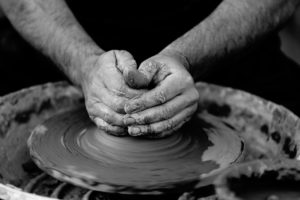
Photo by Quino Al on Unsplash
An engaging character is one who defies labels, one who challenges preconceptions, one we empathize with and even care about in spite of the abhorrent choices they make. A well-written character is complex and dynamic.
This week is one of those between places. We’re swinging between Christmas and the New Year, between 2017 and 2018. The holiday season has stirred up our memories, our family situations, our grief, gratitude, and financial fears. We’ve traveled, abandoned our usual diet and routines, gotten worn out and indulged in sugar and alcohol. The flu is abroad. The package was stolen off the porch. The dog bit Santa when he came down the chimney.
Here, my friends, is the between place of authentic character. Not who we wish to be. Not who we say we are. Not who we present ourselves as on Facebook or pretend to be for our families and coworkers or resolve to become in the New Year, but who we are today, with our blind spots, our secrets, our fears, our greasy oven, our favorite coffee cup, indigestion, bills to pay, snow to shovel, our comfy sagging chair and what we choose to do with this in-between time.
Powerful characters. May we create them. May we discover, foster and celebrate them in others. May we honor our own.
All content on this site ©2017
Jennifer Rose
except where otherwise noted
by Jenny Rose | Dec 14, 2017 | Authenticity, Emotional Intelligence, Needs
It occurred to me this morning that, in general, I’m still confused about what I want.
I’ve had a tumultuous history with my own wants. At some point, very early, as I was learning to be a people pleaser, I gave up wanting anything because I thought it was bad. What I understood was that everyone else’s wants were far more important, and it was my more-than-full-time job to provide those wants rather than selfishly have my own. With rare exceptions, that’s been my modus operandi my whole life.
When I went through a life coaching and emotional intelligence program, my coach suggested I had a perfect right to get my needs met, and he defined some of my “wants” as needs, for example my longing for community and connection. I was enraged. Nobody had ever before made such an outrageous proposal. He clearly didn’t understand the terrible vulnerability of needing or wanting anything from anyone. Having the right to get needs and wants met was the most ludicrous, dangerous piece of heresy I’d ever heard.
That was four years ago, and I’m as angry about it now as I was the first time I heard it.
I also can’t leave the idea alone. I think about it all the time.

Photo by John Salvino on Unsplash
I picture my needs and wants as a snarling chained wolf with blazing eyes, nothing but matted grey hair over bones, backed into a tight corner, determined to go down fighting.
I grieve, literally, to admit I chained it there myself. I chained it without food, water or shelter, and walked away — for decades. During those years of neglect, it starved and thirsted. It suffered alone with no help, no hope, a solitary prisoner.
I’ve done a lot of animal rescue work in my time, and I know sometimes an animal is just too far gone to rehabilitate. Sometimes you can save their bodies, but the abuse and neglect they’ve suffered has damaged their will to live and their ability to trust and connect, and rescue comes too late. Sometimes, against all odds, some strength of heart or spirit survives and an animal accepts affection and care, but its body is too starved or broken to heal.
Part of what I’ve been doing since I’ve come to Maine is to try to rescue my chained wolf, this piece of self I rejected, denied and tried to destroy.
It’s a long process, filled with grief, shame and anger. It takes determination, patience, and the willingness to own my history, my pain and my choices, as well as consenting to my responsibility for my own self-healing. Overcoming internal taboos is desperately hard work, and Wanting is one of my oldest taboos.
Sometime last year I wrote a list titled “Things to Want.” It was short and consisted of necessities, mostly. After a lot of hesitation, I added two things that were not necessary but I just … wanted. It felt wrong. It felt shameful. I left the list on my desk and over the following days and weeks I looked at it as I went about my life. About eight months later I bought one of the unnecessary things, a perfumed body oil I love. It cost about $25.
It was like offering a little bit of bland food to my starving wolf, pushing it near with a stick so as to avoid getting mauled. Not so much food as to make it sick, but a place to start.
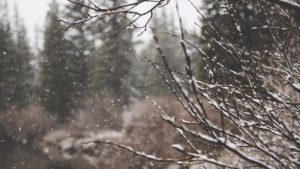
Photo by Arun Kuchibhotla on Unsplash
This morning, in the pause of winter and our first big snowstorm, my partner and I talked about our plans, our dreams, and our progress. Later, I went out to walk in the snow and I suddenly saw another layer to wanting, another step closer to making amends to my chained wolf.
Wanting is just the beginning. Making a Christmas list is only the top step. What’s the list under the Christmas list, and the list under that? What is it I really want, independent of anyone else? What about the dreams I hold in common with no one, that are just about and for me? If I was free — If my wolf could bound through the snowy landscape and disappear into the Yule forest — what would I want? If we could escape judgement, our own and others’; escape for a moment our stories and labels and self-definitions; escape family, social and tribal expectations; escape our ideology (most imprisoning of all) and want, honestly, nakedly, with all our hearts, what would that Christmas list look like?
In other words, it’s not about the perfumed body oil (Aphrodisian Fire, by the way, from Kate’s Magik). It’s about touch, scent and caring for my thinning skin. It’s about deliberately honoring my own feminine sensuality.
I don’t need any particular product, cosmetic, clothing, gizmo or piece of technology in order to honor my own feminine sensuality, although there are plenty of things to buy that might support that want, including Aphrodisian Fire, but I see now those are really just symbols. I have the power to honor my sensuality in the way I live — in the choices I make about who I connect with and how, and how I treat myself.

Photo by Caley Dimmock on Unsplash
Santa hasn’t got my choices in his sleigh.
I’m very attached to the dreams my partner and I hold in common. I love our vision, and I’m invested in it. It’s going to take a lot of money, and we don’t have that right now.
Maybe we won’t ever have it.
Maybe I was a damn fool (again) and I should never, never, have listened to someone who says it’s okay to have needs and want them met. Maybe I should walk away from my wolf again, and this time never come back. Let it starve to death.
But maybe our grand vision and plans are only the top layers of what I really want. Maybe the plan is the wrapping paper around the real treasures of self-reliance; living as part of a complex, self-sustaining system; building independence from the energy grid and a culture I largely can’t support; fostering community and trusting in my greatest joy … writing.
I don’t have to wait for the plan to happen to have those things. I don’t need money. I don’t need to wait for someone else. I don’t need to brutally imprison or eliminate my wants and needs. I can be learning, building and transforming my life right now, today, from the inside out. I can, day by day, draw a step closer to my wolf with food, with water, with a gentle hand and with compassion, and maybe, one day, come close enough to remove the chain and let the poor creature go free and wild into the world, wanting and needing as it will.
So, I’m making a list and checking it twice. Or three times. I’m peering underneath the items, things, objects, stuff on that list. What is it I really want? What am I really longing for? And if I look under that, what do I find? What are the deepest wants and needs?
Merry Christmas, everyone.

Photo by Galina N on Unsplash
All content on this site ©2017
Jennifer Rose
except where otherwise noted
by Jenny Rose | Dec 7, 2017 | A Flourishing Woman, Mind
Scrying is “the practice of looking into a suitable medium in the hope of detecting significant messages or visions.” (Wikipedia)
My laptop has developed the Technical Flu and is in the shop. I’m chagrined to discover how much I depend on it. It’s the only portable device I have, as I still resist the pressure to obtain even a cell phone. Suddenly, my access to music, DVDs and the Internet is restricted. I know, it’s a first world problem, but I’m not complaining. I whined for the first few days, but as I sit down to write this post what I mostly feel is a kind of grateful wonder.
In my laptop’s absence I find a lot of quiet. Without my usual entertainment and distraction, my ears, eyes and attention are freed. As I work on the second book of my series, I’ve picked up a sketch pad and colored pencils in order to create a map of my very complex world where the myth, fairy tale and oral history of several cultures meet and interact. Without access to my one-dimensional outline on my word processor, I recognize the need for a two or even three-dimensional model to truly show all the connections and correspondences of the series. I’ve discovered new depths to my creative vision and work and considered new ways to approach it.

Photo by Ludde Lorentz on Unsplash
Folk and fairy tales often speak of depths. Caves, tunnels, wells and stairways descend to other places, magical underground kingdoms where evil beings lurk and flex their destructive forces and unexpected but powerful animals or crones or fairies save the hero or heroine. Gypsies, oracles, shamans and seers scry crystal balls or pools of water, smoke, fire, mirrors or stones. Runes whisper messages. Tarot cards reveal enigmatic insight.
We are in the depths of seasonal darkness now. In two weeks the light begins to return. Here in Maine the day starts to fade at 3:30 in the afternoon and an hour later it’s full dark. What do the depths of darkness hold? What lies between the stars? What dreams unfold behind our eyelids during the long sleeping hours? What lives, hunts and dies in the winter-bare forests under the moon? What stirs in the dark sea’s deeps?
If we could separate ourselves and all those around us from our tech and toys, if we could all free our eyes from the screen and our ears from the noise and look, clear-eyed and undistracted, at those around us, what would we see in one another? If we were forced to sit quietly at a window with nothing but a chair for company, what might we discover in the world around us? If we stand naked and alone in front of a mirror and look into our own eyes, what looks back at us?
What lies in the depths of longing and loss? What lies denied and amputated in the deeps of a soul? What waits to be rediscovered or reclaimed, healed or released?
Some of the deepest, darkest, coldest and most fearsome depths in my life turned out to be only ankle-deep after all. Ankle deep and unpleasant, but, once challenged and understood, pathetic and sad rather than powerful and terrible. Shallows pretending to be depths. A leech or two instead of a sea monster.
Other shallows are so seductive, so enticing, so shiny, that we joyously bare our feet and run into them, gradually wading farther and farther from shore, our attention captured, our gaze fixed on their captivating surface, and there we stay until we die.
All my life I’ve been told I’m too intense. I’ve never known exactly what that means, and the criticism never fails to both hurt and irritate, especially as I can’t get more information. Asking probing questions is simply an example of my obnoxious intensity, it appears.
I wonder this morning if what people are expressing is discomfort with my love for the depths, for the dark where miracles happen, for the hidden thing, be it dreadful or dazzling. Questioning is falling out of social favor. Political correctness shackles and gags us. The shiny shallows are the place to be, where text messages, emojis and ‘likes’ glitter and frolic and algorithms and ideology teach us what to think, believe, value and buy.
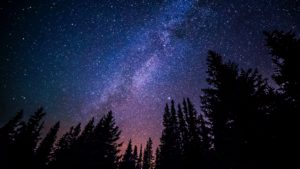
Photo by Ryan Hutton on Unsplash
I can be seduced by the shallows as well as anyone, and have several times been fooled by them, but somewhere inside me resides a wild thing, a female creature that glories in the power of the dark and deep and always returns to passion, emotion, and creativity. I want to dive into the night sky and swim naked among the stars and nebulae. I want to see and be seen, hear and be heard, know and be known. I navigate with a mouthful of questions and an insatiable curiosity. I don’t want life to be pretty and distracting and shiny. I don’t want all my dreams to be sunlit and filled with flowers and kittens.
I want life to be as it is, smelling of musk and blood and starlight, dark and powerful and magnificent beyond my puny imagination. I want the hot eroticism of life and the torn flesh of death. I want to embrace the unknowable, kiss the lips of mystery and reclaim and wield the full power of my fear.
I choose to live in the depths.

Photo by Christopher Campbell on Unsplash
All content on this site ©2017
Jennifer Rose
except where otherwise noted
by Jenny Rose | Oct 12, 2017 | A Flourishing Woman, The Journey
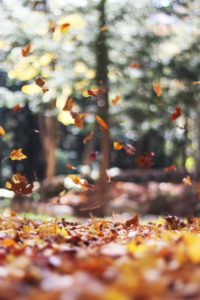
Photo by Autumn Mott on Unsplash
I love autumn, and autumn in New England is particularly poignantly beautiful. The leaves, oh the leaves! It’s as though the trees release their passion in one final gasp of ecstasy before their long sleep. The colors stun the senses with their beauty; it’s almost too much to absorb. Yet the trees’ splendor is fleeting. Inexorably, the leaves fall like golden tears, like blazing sparks, and as they fall the greatest power of all is revealed: The true shape of things.
The green and fiery sea of the forest and fields recedes. Lichen-covered rocks bare themselves. Trees stand or lean in bony beauty, gnarled and hollow, smooth and upright, each species clad in its own color and texture, but now the colors are russet and ivory, shades of brown and grey touched with black. Thorns and stems become semi-transparent cover for winter-colored birds and animals.
The bare forest is everything it is and nothing it is not.
I, too, am becoming reduced to my essential self. Confusion, guilt and shame are loosening their hold on me and drifting away, and I make a resting place for them in my writing. I look back in my memory and, for the first time, begin to see the true shape of things. All the words that weighed me down and kept me small, all the gaslighting and controlling, all the lies and distortions, are responding to some miraculous internal seasonal shift and slant of light. I am bursting into triumphant understanding, and then letting go, letting all that does not serve me fall away. My true shape emerges, and it’s strong and clear-seeing and wise. It always was.
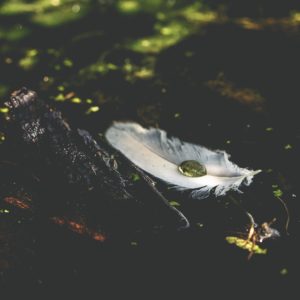
Photo by Erik Stine on Unsplash
Now I begin to see the true shape of things. Now begins a season without pretense, unencumbered by expectations. Now the lineaments of my feelings lie bare. The landscape of my life becomes stark and uncomplicated, a walk through winter woods where a feather is a feather, a quill a quill and a swatch of fur on a thorn exactly what it is, not more, not less, not something else entirely. I reclaim the dignity of my own perception, intuition and experience.
It does not surprise me that traditionally this is the time of year when the veil between the worlds thins, ghosts walk, legends come to life, ancestors are honored, and we acknowledge that which haunts us. I do not fear my ghosts. Indeed, they’re old friends and companions. My bogeymen were flesh and blood concealed beneath dazzling costumes of false power, fearful only as long as their true shape was hidden from me.
Some fear the fading light, endings and truth. Some prefer the riot of distraction and confusion. Some refuse to see or know the true shape of things. My own courage is not strengthened by distraction, no matter how beautiful or seductive. My courage is a thing of unadorned simplicity, spare and clean as bone.
The leaves fall, ravishing, rapturous. At last, the true shape of things emerges from the blaze, pure and indestructible, and I embrace it like a lover.
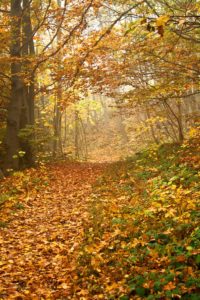
Photo by Vanessa von Wieding on Unsplash
All content on this site ©2017
Jennifer Rose
except where otherwise noted
by Jenny Rose | Oct 5, 2017 | Emotional Intelligence, Feelings, Love
A few weeks ago I wrote about romance and in that post I confessed that at this point in my life I’m not sure what love actually is. A strange admission from a reasonably intelligent, well-educated, middle-aged broad with two marriages and two children in her history.
Writing that post enabled me to clearly separate romance from love; though I suppose love might include a little romance from time to time. I’m convinced romance is not synonymous with love, however. I began to make a mental list of what love is not, as I often approach things from the back door first. Love is not a synonym for:
- Romance
- Sex
- Slavery
- Control
- Possession
- Obsession
- A suicide pact
- Abuse
- Fear
- Duty
- Obligation
- Enabling
- Obedience
All right. So what is love? My Randall House Collegiate Dictionary says it’s “a profoundly tender, passionate affection for a person” or “a feeling of warm personal attachment or deep affection.” This definition doesn’t satisfy me at all. My rewrite is that love is a feeling of warm, tender connection and deep affection. I don’t think love is always passionate and I don’t like the word attachment. If anything, love implies to me an attitude of nonattachment.
But what about unrequited love? What about failed love or withdrawn love or love as a weapon or a tool? What about the inability to accept love, or feeling unloved though being told we are? What about those who make us feel our love is ugly, twisted, shameful or inadequate?
I’m always playing with words in my head. This week it’s “What is love?” and “What is a crone? and “What are the differences between compassion, empathy and sympathy?” I lie down with those inquiries and wake up with them. I turn them over while I shower, cook bacon, wash dishes, take my morning walk, practice Tai Chi and drive to town. I’m constantly scribbling notes.
I gave a neighbor a lift this morning and asked him to talk to me about compassion, sympathy and empathy. Poor man. He didn’t know what to make of me.
Yesterday, during my frosty morning walk, I dove into a stand of staghorn sumac below the barn and went to visit the spring. This is a daylight spring seeping out of the hill on which the barn and house stand. A long time ago, someone dug a well there, and at one time a pump and tank were installed, along with a system of black plastic outdoor lines to carry water to and from the barn, the garden, and down through the woods to, presumably, crops in the fields below. All the equipment is many decades old now, fallen over and covered with leaves and moss. The well is protected by a round cement cap, much too heavy for me to lift alone (drat!).
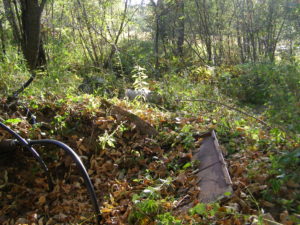
Spring
This spot is hidden in a thick tangle of vine, briar and trees. We rarely go in there, though it’s in close proximity to the barn.
It’s fall and it’s been dry, but the drainage where the spring emerges is clearly marked by rocks and moss. The ground underfoot felt soft, and when I brushed away the leaves I found moist earth. A yard or two below that is mud, and then a trickle of water and then, at the bottom of the hill, a quiet film of water, barely moving, reflecting the tree-laced sky. Right now It’s full of apples dropped from an apple tree that grows alongside it.
As I slipped and slid, tripping over vines and getting scratched by hawthorn and raspberry bushes, feeling the velvety moss coating the rocks and stepping cautiously on rotting wood, it occurred to me that love is like this spring.
I’ve always thought of love as an action verb, something I do to another in exchange for receiving the same. I thought I knew what I meant when I used the word, though I was never challenged to define it exactly. For me it’s been a catch-all term, synonymous with dozens of other, more specific actions: Want, need, desire, honor, trust, respect, care about, listen to, defend, make excuses for, enable, protect, support, believe in, etc., etc.
But what if love is just being? What if it has no object, but just is?
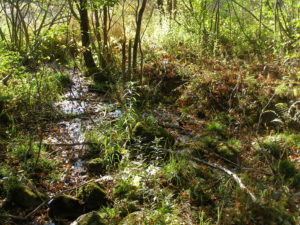
Spring
This little spring is absolutely true to itself. Water drains off the hillside above us and carves a path through the earth and rock until it emerges and runs down the surface at the foot of the hill. We pay no attention to it whatsoever. It’s reliable, predictable and faithful, but not because anyone is looking. Its unobtrusive, quiet presence has created a lush pocket of life, a complex system of plants, fungi, animals and insects, but ten yards away on the open hillside it’s invisible.
What if I make a choice to allow my feeling of love to run through my life in the same way the spring runs through and over the ground? What if I carry within me a wellspring, a hidden cleft, moist, fertile, filled with life, rich in sensuality, simply because it’s an expression of self? If others find their way to it, sit a while, bathe, drink, and allow it to nourish and refresh them, they’re welcome. If others can’t see it, or don’t value it, or dislike the perfume of rotting wood and leaves or the feel of plush moss under their bare foot, it’s nothing to do with me. Not everyone chooses to make their way through raspberry and hawthorn bushes, after all.
What if I don’t need anything in return because I’m giving nothing away? Perhaps the act of love can be a simple state of being, not a totality, not a hurricane of passion and lust, not a romantic fairytale, not a prison and torture chamber, but a spring, a waterway, a shining thread I can share without depletion. Can I allow it to seep quietly up through the roots of my experience, even if no one else ever finds it, wants it, returns it or deems it acceptable?
Our spring is part of a landscape of field and forest, river, pond and stream, rocky hillside and bog. The landscape contains many forms and embraces many systems of life. Birth and death happen on this land. Disease, erosion and flood happen on this land. Prey and predators carry out their sacred dance of balance here. Blood, bone, fur, feather, antler, musk, urine and feces are all here.
I, too, am a complex system of history, memory, belief, thought and feeling. I do not feel love for everyone and everything. My experience of love is that it’s a wild thing; it seeps up where it will and trickles away without warning, taking no account of rules and expectations. I can’t command it and I don’t choose to hold it back. My love doesn’t need anyone’s reception, appreciation, validation or praise.
Love is. I reserve the right to love as I will. I am the keeper of my own wellspring.
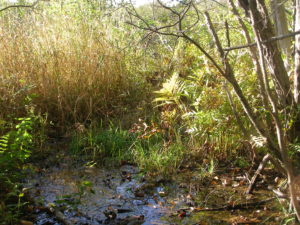
Spring 10/2017
All content on this site ©2017
Jennifer Rose
except where otherwise noted
 The Johari Window is a concept created by a couple of psychologists in the 1950s to help people understand their relationships with themselves and others. The window suggests that we cannot see ourselves or others entirely; there is always a space of possibility to discover. Fully defining character becomes a community project. Even so, the unknown or hidden parts of character can and do appear suddenly and overwhelmingly, often resulting in some kind of heinous act and leaving us struggling with what we missed, what we didn’t know or what we didn’t want to admit.
The Johari Window is a concept created by a couple of psychologists in the 1950s to help people understand their relationships with themselves and others. The window suggests that we cannot see ourselves or others entirely; there is always a space of possibility to discover. Fully defining character becomes a community project. Even so, the unknown or hidden parts of character can and do appear suddenly and overwhelmingly, often resulting in some kind of heinous act and leaving us struggling with what we missed, what we didn’t know or what we didn’t want to admit.













